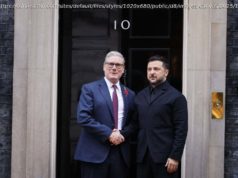Beijing’s involvement in the Middle East is deepening as the kingdom’s ties to Washington come under increasing strain, writes Jonathan Fulton
In the wake of Jamal Khashoggi’s murder, there is a sense that US-Saudi relations are especially strained, and that China’s influence in Saudi Arabia could increase as a result.
While leaders in Beijing and Riyadh are certainly drawing closer together, a natural result of shared economic interests, it is far too early to assume that China is capable of – or interested in – replacing the USA as the dominant external power in the Gulf.
At the same time, the inconsistent American response to the Khashoggi murder has reinforced the perception that US leadership lacks a clear vision of Middle Eastern order. Regional leaders are consequently hedging their bets, deepening ties with as many extra-regional powers as they can to diversify their economic and security guarantors.
This is not new. Since the disastrous US-led war in Iraq, Saudi leaders have been publicly critical of Washington’s Middle East policy, and increasingly have looked towards China as a future counterbalance for their reliance on the USA.
The bilateral relationship has intensified on several fronts – including construction and infrastructure development, investment, and security – culminating in a comprehensive strategic partnership signed when President Xi Jinping paid a state visit to Riyadh in 2016.
This has led to even deeper levels of cooperation, as Saudi Vision 2030, a development programme championed by Crown Prince Mohammed bin Salman, has been linked to China’s Belt and Road Initiative.
There has been an increase in official visits, resulting in military joint training exercises, deals potentially totalling over US$135 billion, the establishment of a joint investment fund focused on energy cooperation, and a memorandum of understanding on nuclear cooperation.
In short, the bilateral relationship is about more than oil.
As the Sino-Saudi relationship has deepened, US-Saudi relations have been erratic.
During the Obama administration the relationship had deteriorated so badly that King Salman refused to attend a US-Gulf Cooperation Council summit at Camp David in 2015.
President Trump’s election was viewed as a reset, evident in his warm welcome when he made his first overseas presidential visit to Riyadh.
Despite his anti-Islamic rhetoric and inconsistent and unpredictable Middle East policy, his hardline stance against Iran was welcomed by Saudi leaders and seemed to compensate for their divergent views on issues considered less important.
Washington’s reaction to Khashoggi’s murder, however, caught the Saudis off guard.
The day he was killed, Trump gave an interview during which he insulted the Saudis, saying they “might not be there for two weeks without us”.
Trump’s comments have swung from support for Prince Mohammed to threatening “severe punishment” if it were proved that he was involved.
Members of the US Senate Council on Foreign Relations have been especially vocal in their anger, with Senator Lindsey Graham threatening to “sanction the hell out of Saudi Arabia.”
The crown prince is said to have been enraged by the public condemnation. The Wall Street Journal reported that he “feels betrayed by the West.
He said he would look elsewhere and he will never forgive how people turned against him before evidence was produced.”
Will he turn to China? At last week’s “Davos in the Desert” investor conference, Chinese firms were active participants, and Chinese leaders have avoided publicly commenting on the Khashoggi murder. Last week Vice-President Wang Qishan toured the Middle East, visiting the United Arab Emirates, Egypt, Israel, and Palestine, emphasising China’s deepening regional role.
At the same time, the Saudi-US relationship has overcome several low points over the years. For the time being, its partnership with the USA remains the central pillar of Saudi Arabia’s foreign policy, and Saudi is a key component of Washington’s Middle East policy.
China is not yet as important an external partner for Riyadh. As its regional footprint deepens, however, we can expect a larger role for China in Middle Eastern security issues.
Jonathan Fulton (@jonathandfulton) is an assistant professor of political science at Zayed University in Abu Dhabi, United Arab Emirates






